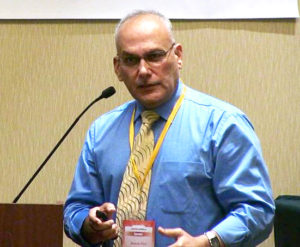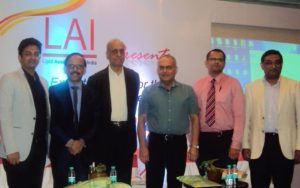Saviour of Hearts
Dr Raman Puri has played a significant role in reducing incidences of heart attacks in India by creating awareness about the urgent need for lipid management in patients suffering from coronary artery disease, hypertension and diabetes
By Team Double Helical
Noted interventional cardiologist of the country Dr Raman Puri has been tirelessly crusading since long for spreading awareness among citizens in the country about the grave need for getting their lipid profiles screened in time.
He founded the Lipid Association of India (LAI) which comprises a team of eminent doctors in the field of cardiovascular, internal medicine, pharmacology and young doctors interested in the field of lipidology. The objective of LAI is to focus on research activities related to prevalence of dyslipidemia within various age groups in India. Dyslipidemia, or commonly known as high cholesterol level is a disease condition in which the levels of bad cholesterol (like triglyceride, low density lipoprotein [LDL] and total cholesterol) increase while the level of good cholesterol (HDL) decrease making a person prone to developing heart disease.
LAI had in the past conducted an ongoing project to study the prevalence of dyslipidemia in school going children of the age group of 14 to18 years in Delhi. The same study is due for publication. The thrust of the LAI has been on creating awareness among general public regarding the adverse effects of dyslipidemia, thus achieving the ambitious aim of ‘Healthy Heart for Better Tomorrow,’ eventually leading to reduced incidences of heart attacks in India.
LAI has been organizing ‘Heart related Summits’ at different destinations. These summits are a continuation of the educational series that LAI has been organizing. Besides, LAI has also been organizing free health camps at various places in Delhi-NCR.
Dr Puri has played a significant role in conducting a series of medical educational summits in the field of dyslipidemia, hypertension, acute coronary syndrome and heart failure by holding one-day CMEs in the above field on a regular basis. He has been assiduously working to help reduce the number of heart related ailments and heart attacks in the country. For this, he has been organizing regular health check-up camps, Run for Heart campaigns as well as national level and international level seminars for creating widespread awareness about the serious perils of heart related ailments and complications.
Elucidating more on the same, Dr Raman Puri shares, “LAI is one of the few medical societies in India committed to prevent and treat dyslipidemia. Dyslipidemia is considered a silent killer in males and females. Obesity and habits such as a sedentary lifestyle, consumption of unhealthy food among adults and children can lead to a high cholesterol level and precipitate heart disease. Several guidelines to treat dyslipidemia have been designed by western countries. Lack of both epidemiologic and trial data forces us to use western guidelines to treat our dyslipidemic population.”
Dr Puri makes a very pertinent point when he says, “It is important to understand that western guidelines may not be applicable to Indians since our genetic profile is different. It is prudent to gather data on the incidence and type of dyslipidemia of Indian population in order to frame effective treatment guidelines. In view of this, LAI had taken the initiative to develop indigenous expert consensus statement for the treatment of dyslipidemia in Indian which was published in JAPI March 2016 edition.”
The LAI’s expert recommendation was unique in recommending the level of LDL cholestrol less than 50 mg/dl in patients with established Atherosclerotic Cardiovascular Disease (ASCVD) in contrast to targets of less than 70 mg/dl of LDL cholesterol in European and American guidelines. In the past five years, LAI has conducted numerous free medical checkup camps encompassing several areas in and around Delhi.
In one of the studies of 2502 school going children, school-going children in urban and semi-urban parts of Delhi were found to be at high risk for dyslipidemia. The gravity of this risk lies in the fact that dyslipidemia (abnormal lipid profile) in childhood predisposes to cardiac disease in young adults. The study shows that substantially high proportion of boys and girls either have a borderline or lower level of the protective cholesterol, HDL.
Nearly half of the children in the LAI’s study, including both boys and girls, either had high or borderline high levels of triglyceride. In addition, other parameters like non-HDL cholesterol, LDL- cholesterol and total cholesterol were also deranged. This is an alarming signal to all the medical fraternity and the general population to take appropriate actions to raise awareness regarding this problem, and to institute preventive measures. If we remain lax and indifferent today, then we will be putting substantial percentage of our paediatric population at risk for cardiovascular event in the next 10-20 years.
LAI has so far conducted four international summits and five national summits since 2012 in which a large number of experts from India and overseas have participated to share their expertise and experience to combat dyslipidemia. LAI is also committed to create and promote awareness about dyslipidemia in South East Asian as well as other developing countries for which it is organizing for the first time an exclusive South East Summit on lipids in December 2017 by involving cardiologists who are committed to overcome this emerging challenge. In the 4th International Summit on lipids which was organized in August’ 2017 in the capital, LAI announced ‘Delhi Declaration 2017 on Lipid Management’, wherein, a group of experts comprising cardiologists, endocrinologists and physicians dealing with the day-to- day management of serum lipids, unanimously emphasized upon the urgent need for lipid management in patients suffering from Coronary Artery Disease (CAD), hypertension and diabetes mellitus.
This is based upon the fact that there is increasing prevalence of CVD in India. This high prevalence is due to increased prevalence of diabetes, hypertension, smoking, obesity and sedentary lifestyle. This in turn will have a deleterious impact on health and cause severe blow to economy due to loss of working hours and medical expenditure. All this is preventable by treating serum lipids (fats in the body) which play an important role in all the diseases mentioned above. Due to these reasons, our risk of developing heart diseases is four times more than the Americans, 6 times more than the Chinese, and 20 times more than the Japanese.
The CAD is more severe in Indians as it carries a higher mortality rate. If this trend continues, the day is not far when by 2020, India will become ‘Heart Diseases Capital’ of the world with more than 40% of deaths in the country due to CAD. This increased prevalence will obviously result in economic burden on the government. Thus, it is desirable that we should aggressively campaign for the Lipids management for prevention of CAD.
This campaign including lipid profile check should be made mandatory at the time of admission in colleges, as recommended by the expert consensus statement by LAI published on March 2016, public lectures, messages through press and electronic media and increasing awareness through medical fraternity. Adds Dr Puri, “I have always opined on different public forums that the best birthday gift from parents to their children would be getting them screened for the risk factors for CAD including lipid profile.”
About Dr Puri
Dr Raman Puri is working as Senior Interventional Cardiologist at IP Apollo Hospital since October 1996. His work involves interventions including coronary angiographies, coronary angioplasty and stenting, valvuloplasty, device closure of the heart defects such as ASD, PDA and pacemaker implantation besides clinical cardiology practice. He has special interest in preventive cardiology especially dyslipidemia and hypertension.



